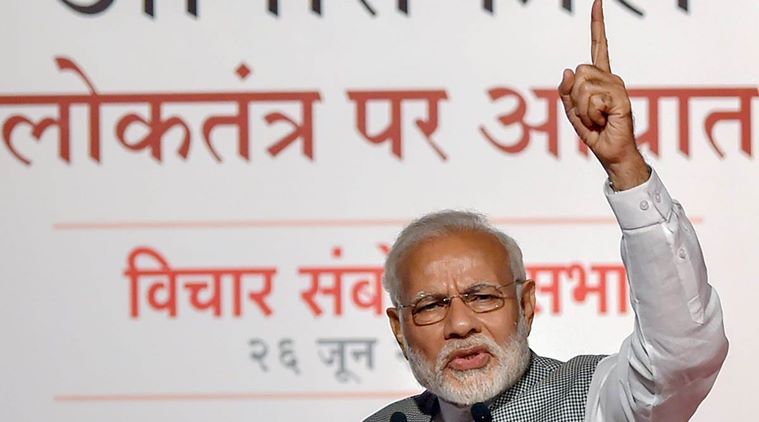Back to old times?
For those Indians who gave Modi a full majority it was because the words ‘parivartan’ and ‘vikas’ came as music to their ears.

Modi’s appearance on the national stage threatened the existence of this ruling class.
In our ‘secular, socialist’ republic it is not easy for us political pundits to take the path less travelled. In the old days if you said that socialism and our total submission to the late Soviet Union were bad things you got labelled a CIA agent. In present times if you dare say, as your columnist has done, that you support Narendra Modi’s programme to transform India into a prosperous country by taking a route that is not socialist then you get labeled a ‘bhakt’. The word means devotee but is today a term of abuse. There are political pundits who openly exhibit fealty to Marx or Nehru and they remain mysteriously unlabelled. But, this is as is in Indian political journalism.
So now that Modi has mostly failed to deliver change and development on the expected scale and has actually transformed himself into a Nehruvian socialist, I am the butt of many sneers and much schadenfreude. This is why this week indulge me when I remind you why I, and millions of Indians, supported Modi in 2014. For those Indians who gave Modi a full majority it was because the words ‘parivartan’ and ‘vikas’ came as music to their ears.
They looked around at their squalid villages and towns, at the dreadful public services they were forced to use and at the general despair that surrounded them and knew that if someone was promising change they should vote for them. In the memorable words of Surekha, who was born and continues to live on a pavement in Mumbai, ‘We have lived like this for so long and continued to vote for the Congress. So when we heard Modi would bring change we thought it was worth giving him a chance.’
As for my reasons for supporting Modi they came mostly from contempt for those who ruled the India in which I cut my political teeth. It was an India in which colonial rule had been replaced by a ruling class that was totally colonised. Denizens of this class spoke mostly English, espoused socialist principles but occupied the most expensive real estate in India: Lutyens Delhi. Most other Indians fell in a category called ‘the common man’, and they built for this unfortunate entity the worst public services possible. Nobody they knew, except their servants, used government schools, hospitals or transport but they did not think there was anything wrong with this.
Into this ruling class were allowed, as time went by, those plebian political leaders whom they were forced to permit for reasons of votes and democratic compulsions. These leaders soon became as elitist in their ideas as the old ruling class and in careful emulation of the Imperial Dynasty that presided over this ‘idea of India’, quickly learned the benefits of hereditary democracy and of using public service to loot and prosper. Into this ruling class were admitted leaders disdained as ‘communal’ like Atal Bihari Vajpayee and L K Advani, but who adapted easily to the ways of the ruling class.
Modi’s appearance on the national stage threatened the existence of this ruling class, so I supported him. I do not hesitate to admit that I am deeply disappointed. When he abolished the Planning Commission I saw it as a sign that he would reduce the overwhelming powers of the Indian State to interfere in economic activity. This has not happened. He has shown himself to be not just a statist but a Nehruvian socialist. And, in his obsession with finding ‘black money’, he has unleashed upon small entrepreneurs these days an army of corrupt taxmen who have the power to destroy small businesses. They revel in their power to humiliate and extort and now have more licence than ever. So it surprises me not at all that thousands of businessmen have fled our shores.
Not every entrepreneur is a Vijay Mallya. The people who have been most badly hurt by demonetisation and the complex ways of GST are small businessmen and traders. This is the traditional BJP vote bank and it is hard to meet one of them these days who is not very disenchanted with the man they once saw as their hero.
On the political front, I personally had genuine hope that Modi would bring real change especially in changing a political culture that gives our elected representatives the illusion that they are ballot box princes. Sadly this has not happened, and if Modi could wander incognito and observe how his ministers and chief ministers behave, he would understand why the BJP could lose next year’s general election to that same old caboodle. So certain is this caboodle of winning in 2019 that they have already begun to celebrate what they consider a victory for the old ‘idea of India’. These fine words conceal an elitist, corrupt ruling class, but what to do?
For all the latest Opinion News, download Indian Express App
More From Tavleen Singh
- Fifth Column: What can Modi do now?So can Modi do anything in the next few months that would restore the lustre that once made him seem undefeatable? There are those who…
- If not Narendra Modi then who could be India’s next PM?If not Modi then who could be India’s next prime minister? Is it time to start asking this question? I think it could be because…
- Confusion and horror in KashmirThe United Nations released its first ever report on human rights violations in the Kashmir Valley. It recommends a commission of inquiry into the ‘excessive…








































No hay comentarios:
Publicar un comentario